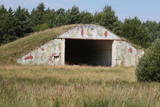PZ – “Podgraņičnaja zona”
Before long, a Russian man arrived, wearing Kirza boots, his assault rifle on the shoulder and a dog on the lead. I never guessed from where he appeared. I had a little red booklet in my pocket, titled “Ļesnaja služba SSSR” (the USSR State Forestry). It was my job certificate He saluted and left, as I was an official and had the right of access in the zone. It was very important that the booklet had red cover and the letters USSR – it was a safe guarantee that I was not a foreign spy and was not going to flee.
In 1976, I started to work in the Vērgale forest district as a forester’s assistant. That was until 1982. They persuaded me to chair the village council of peoples’ deputies. In the end of the 80-ies, I left the post, worked for the collective farm a couple of years, and in the beginning of the 1990-ies, I returned to work in the Vērgale Forestry District.
When I settled in Vērgale and married, the parish territory was a border area with all the consequences. It was a limited access zone. The registered residents could move within the zone if they had a stamp in their passports with two letters - „PZ”, podgraņičņaja zona (border area).
Until 1995, there was a train between Liepāja and Ventspils. You could buy a ticket from Liepāja to Ventspils or the opposite direction, and you could get off the train wherever you pleased. The same worked with busses. There was a bus route Liepāja – Aizpute via Apriķi, and there was a stop „Binderi”. I got off the bus there and easily walked to Vērgale. They did not sell tickets to Vērgale. Border guards used to stop cars on the road and check documents, but little by little, the strong regime weakened.
It was not so easy to get to the seashore. I remember an incident – I went swimming with my family, two small kids, at Ziemupe, not far from the “Laikas” house. Before long, a Russian man arrived, wearing Kirza boots, his assault rifle on the shoulder and a dog on the lead. I never guessed from where he appeared. I had a little red booklet in my pocket, titled “Ļesnaja služba SSSR” (the USSR State Forestry). It was my job certificate He saluted and left, as I was an official and had the right of access in the zone. It was very important that the booklet had red cover and the letters USSR – it was a safe guarantee that I was not a foreign spy and was not going to flee. If I am right, there were three military units at that time in the Vērgale village territory. There was a border guard post at Šķēde, near Liepāja, with some 50 men. In Ziemupe, there was a missile unit (they were “land-to-air missiles” to shoot down aircrafts, but as far as I know, not a single missile has been fired from there). There were missiles, in station and on vehicles, in combat status. There was another military unit at Saraiķi (between Ziemupe and Šķēde), but I do not really remember what it was. There were no strategic and nuclear arms in Vērgale.
There were “the blacks” or a marine border guard unit located not far from Akmensrags, within the municipal territory of the present Pāvilosta region. There were border guards also in Pāvilosta and a base where ships and submarines were fuelled.
Military training often took place. The local people were notified in good time. It is the same today, when the Latvian Army does training.
There was no really hostility between the locals and the military. Through years, both parties had used to each other. There were some benefits, too. The military helped the municipality to maintain order in the village together with the municipal guards. All kinds of hooligans and tramps respected them. There were times when we could not get meet, butter, cigarettes or other goods in shops. Then we fed on military supplies and went to the missile unit’s shop in Ziemupe. They had their own supply and they let us go shopping there.
There was some benefit from access restrictions. We still have pristine nature along the coast; the environment is unpolluted, clean, and vacant due to being formerly a border area. In this respect, we were winners, but still this matter cannot be viewed only from one side.
The officer wives also involved in the local life, one of them was the manager of the local canteen in Vērgale.
There was not really a very strong cooperation between the military and the village. In our case, it was not like the municipality head and the military would trade some pork for cement. The military just helped to ensure order, especially during festivities.
Inspections from “above” were usual, as it is military in all times, especially when some general from Moscow wanted to go fishing and booze. Inspections were imminent whenever some accident happened. I remember, around 1980 someone fled from Dobele town to Gotland in a kukuruznik (agricultural aircraft). There was a serious investigation and, most probably, some officers lost their shoulder straps. However, nothing anti-government really happened here.
In Saraiķi and Ziemupe there were designated sites where the local people could go to the sea in set hours. In summer, these hours were longer, in winter it was a very short time. In 1980-ies, they did not harrow the beach any more, but in the dunes, they still ploughed a lane with a field cultivator. They refreshed it once or twice a day. Barbed wire was installed right after the war, but it did not work long. Communication line was maintained in excellent order all the time.
To go sea fishing, people needed permission from the border guard officer. It depended on how you negotiated because in our place sea fishing in boats was prohibited. Russians wanted some fish from time to time, and when they wanted to drink some vodka with Latvians, they found out if there was no inspection coming, and went fishing together. They never left fishnets in the sea because they would have to come after them and it was not safe. They used sweep-nets often, where there were no stones, by Akmensrags and Šķēde.
Fishing was a regular thing. I remember an enormous catch, there were 96 eels at one go, it was the best!
When I settled in Vērgale and married, the parish territory was a border area with all the consequences. It was a limited access zone. The registered residents could move within the zone if they had a stamp in their passports with two letters - „PZ”, podgraņičņaja zona (border area).
Until 1995, there was a train between Liepāja and Ventspils. You could buy a ticket from Liepāja to Ventspils or the opposite direction, and you could get off the train wherever you pleased. The same worked with busses. There was a bus route Liepāja – Aizpute via Apriķi, and there was a stop „Binderi”. I got off the bus there and easily walked to Vērgale. They did not sell tickets to Vērgale. Border guards used to stop cars on the road and check documents, but little by little, the strong regime weakened.
It was not so easy to get to the seashore. I remember an incident – I went swimming with my family, two small kids, at Ziemupe, not far from the “Laikas” house. Before long, a Russian man arrived, wearing Kirza boots, his assault rifle on the shoulder and a dog on the lead. I never guessed from where he appeared. I had a little red booklet in my pocket, titled “Ļesnaja služba SSSR” (the USSR State Forestry). It was my job certificate He saluted and left, as I was an official and had the right of access in the zone. It was very important that the booklet had red cover and the letters USSR – it was a safe guarantee that I was not a foreign spy and was not going to flee. If I am right, there were three military units at that time in the Vērgale village territory. There was a border guard post at Šķēde, near Liepāja, with some 50 men. In Ziemupe, there was a missile unit (they were “land-to-air missiles” to shoot down aircrafts, but as far as I know, not a single missile has been fired from there). There were missiles, in station and on vehicles, in combat status. There was another military unit at Saraiķi (between Ziemupe and Šķēde), but I do not really remember what it was. There were no strategic and nuclear arms in Vērgale.
There were “the blacks” or a marine border guard unit located not far from Akmensrags, within the municipal territory of the present Pāvilosta region. There were border guards also in Pāvilosta and a base where ships and submarines were fuelled.
Military training often took place. The local people were notified in good time. It is the same today, when the Latvian Army does training.
There was no really hostility between the locals and the military. Through years, both parties had used to each other. There were some benefits, too. The military helped the municipality to maintain order in the village together with the municipal guards. All kinds of hooligans and tramps respected them. There were times when we could not get meet, butter, cigarettes or other goods in shops. Then we fed on military supplies and went to the missile unit’s shop in Ziemupe. They had their own supply and they let us go shopping there.
There was some benefit from access restrictions. We still have pristine nature along the coast; the environment is unpolluted, clean, and vacant due to being formerly a border area. In this respect, we were winners, but still this matter cannot be viewed only from one side.
The officer wives also involved in the local life, one of them was the manager of the local canteen in Vērgale.
There was not really a very strong cooperation between the military and the village. In our case, it was not like the municipality head and the military would trade some pork for cement. The military just helped to ensure order, especially during festivities.
Inspections from “above” were usual, as it is military in all times, especially when some general from Moscow wanted to go fishing and booze. Inspections were imminent whenever some accident happened. I remember, around 1980 someone fled from Dobele town to Gotland in a kukuruznik (agricultural aircraft). There was a serious investigation and, most probably, some officers lost their shoulder straps. However, nothing anti-government really happened here.
In Saraiķi and Ziemupe there were designated sites where the local people could go to the sea in set hours. In summer, these hours were longer, in winter it was a very short time. In 1980-ies, they did not harrow the beach any more, but in the dunes, they still ploughed a lane with a field cultivator. They refreshed it once or twice a day. Barbed wire was installed right after the war, but it did not work long. Communication line was maintained in excellent order all the time.
To go sea fishing, people needed permission from the border guard officer. It depended on how you negotiated because in our place sea fishing in boats was prohibited. Russians wanted some fish from time to time, and when they wanted to drink some vodka with Latvians, they found out if there was no inspection coming, and went fishing together. They never left fishnets in the sea because they would have to come after them and it was not safe. They used sweep-nets often, where there were no stones, by Akmensrags and Šķēde.
Fishing was a regular thing. I remember an enormous catch, there were 96 eels at one go, it was the best!
| Tourism objects involved in this story | ||
|---|---|---|
В месте расположения Зиемупской 158-й зенитноракетной базы сохранились различные здания, хранилища для ракет и жилое здание. Объект не используется, территория заброшена и деградирует. |
||










